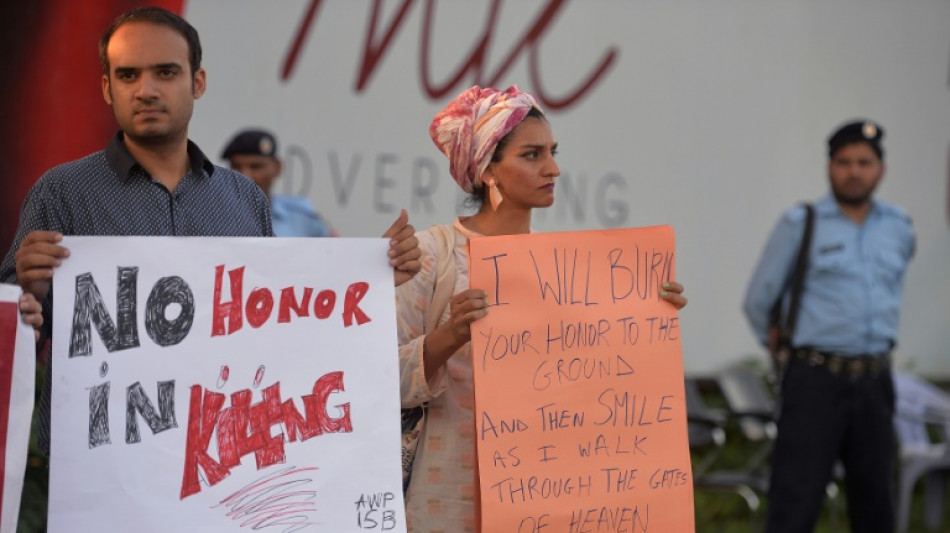
-
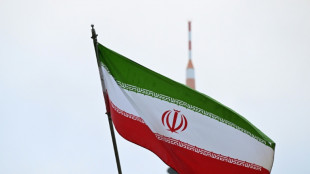 Iran hangs man as Israeli spy after 'unfair' trial: activists
Iran hangs man as Israeli spy after 'unfair' trial: activists
-
Stock markets mostly rise ahead of US economic data, tech earnings
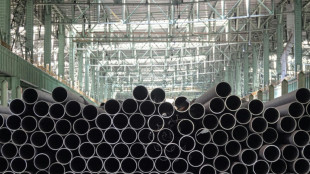
-
 German growth better than expected but tariff turmoil looms
German growth better than expected but tariff turmoil looms
-
Sinner denies beneficial treatment in doping scandal ahead of Rome return

-
 Eurozone economy grows more than expected despite US tariff turmoil
Eurozone economy grows more than expected despite US tariff turmoil
-
Toulouse hooker Mauvaka out of Champions Cup semi

-
 Germany's next finance minister, 'bridge-builder' Lars Klingbeil
Germany's next finance minister, 'bridge-builder' Lars Klingbeil
-
Mehidy century puts Bangladesh in command against Zimbabwe

-
 Steelmaker ArcelorMittal warns of uncertainty
Steelmaker ArcelorMittal warns of uncertainty
-
Vietnam's Gen-Z captivated by 50-year-old military victory

-
 Moroccan-based cardinal says Church does not need Francis 'impersonator'
Moroccan-based cardinal says Church does not need Francis 'impersonator'
-
US official tells UN top court 'serious concerns' over UNRWA impartiality

-
 Jeep owner Stellantis suspends outlook over tariffs
Jeep owner Stellantis suspends outlook over tariffs
-
New Zealand, Phillippines sign troops deal in 'deteriorating' strategic environment

-
 Aston Martin limits US car imports due to tariffs
Aston Martin limits US car imports due to tariffs
-
Pakistan says India planning strike as tensions soar over Kashmir
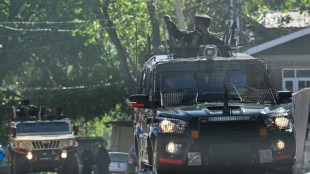
-
 Australian triple-murder suspect allegedly cooked 'special' mushroom meal
Australian triple-murder suspect allegedly cooked 'special' mushroom meal
-
Most stock markets rise despite China data, eyes on US reports
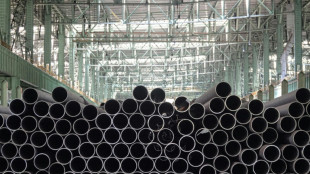
-
 TotalEnergies profits drop as prices slide
TotalEnergies profits drop as prices slide
-
Volkswagen says tariffs will dampen business as profit plunges

-
 Jeep owner Stellantis suspends 2025 earnings forecast over tariffs
Jeep owner Stellantis suspends 2025 earnings forecast over tariffs
-
China's Shenzhou-19 astronauts return to Earth

-
 French economy returns to thin growth in first quarter
French economy returns to thin growth in first quarter
-
Ex-Premier League star Li Tie loses appeal in 20-year bribery sentence
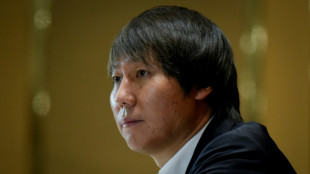
-
 Belgium's green light for red light workers
Belgium's green light for red light workers
-
Haliburton leads comeback as Pacers advance, Celtics clinch

-
 Rahm out to break 2025 win drought ahead of US PGA Championship
Rahm out to break 2025 win drought ahead of US PGA Championship
-
Japan tariff envoy departs for round two of US talks

-
 Djurgarden eyeing Chelsea upset in historic Conference League semi-final
Djurgarden eyeing Chelsea upset in historic Conference League semi-final
-
Haliburton leads comeback as Pacers advance, Pistons stay alive

-
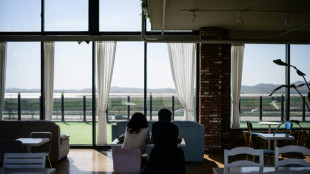 Bunker-cafe on Korean border paints image of peace
Bunker-cafe on Korean border paints image of peace
-
Tunics & turbans: Afghan students don Taliban-imposed uniforms
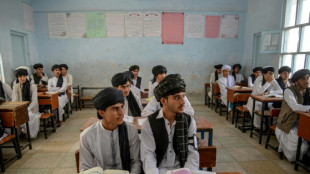
-
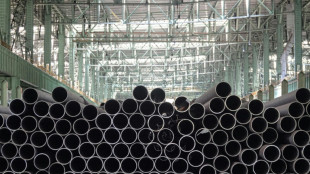 Asian markets struggle as trade war hits China factory activity
Asian markets struggle as trade war hits China factory activity
-
Norwegian success story: Bodo/Glimt's historic run to a European semi-final

-
 Spurs attempt to grasp Europa League lifeline to save dismal season
Spurs attempt to grasp Europa League lifeline to save dismal season
-
Thawing permafrost dots Siberia with rash of mounds

-
 S. Korea prosecutors raid ex-president's house over shaman probe: Yonhap
S. Korea prosecutors raid ex-president's house over shaman probe: Yonhap
-
Filipino cardinal, the 'Asian Francis', is papal contender

-
 Samsung Electronics posts 22% jump in Q1 net profit
Samsung Electronics posts 22% jump in Q1 net profit
-
Pietro Parolin, career diplomat leading race to be pope

-
 Nuclear submarine deal lurks below surface of Australian election
Nuclear submarine deal lurks below surface of Australian election
-
China's manufacturing shrinks in April as trade war bites

-
 Financial markets may be the last guardrail on Trump
Financial markets may be the last guardrail on Trump
-
Swedish journalist's trial opens in Turkey

-
 Kiss says 'honour of a lifetime' to coach Wallabies at home World Cup
Kiss says 'honour of a lifetime' to coach Wallabies at home World Cup
-
US growth figure expected to make for tough reading for Trump

-
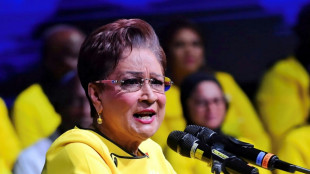 Opposition leader confirmed winner of Trinidad elections
Opposition leader confirmed winner of Trinidad elections
-
Snedeker, Ogilvy to skipper Presidents Cup teams: PGA Tour

-
 Win or bust in Europa League for Amorim's Man Utd
Win or bust in Europa League for Amorim's Man Utd
-
Trump celebrates 100 days in office with campaign-style rally


Getting away with murder in Pakistan
When social media star Qandeel Baloch was strangled by her brother for unapologetically challenging Pakistan's attitudes towards women, activists fought for her murder to trigger a new era of justice over so-called "honour" killings.
Her killer's release in February, less than three years into a life sentence, has instead underlined how the country's legal system still allows for men to abuse, rape and murder women with impunity.
In Pakistan, overlapping legal systems riddled with loopholes and a deeply patriarchal society combine to ensure women survivors of violence are unlikely to get justice, activists, lawyers and survivors told AFP.
"The whole process from the moment a crime is committed against a woman to registering it with the police -- and then the court procedure -- is structured in such a way that justice remains elusive," said Nayab Gohar Jan, a prominent rights activist.
"Add to that societal pressures and stigmas, and you can see the odds are clearly stacked against them."
Much of Pakistani society operates under an "honour" code where women can be killed for bringing "shame" on their families by acts such as interacting with men or marrying someone they choose themselves.
More than 470 cases of "honour" killings were reported to police in 2021, according to the Human Rights Commission of Pakistan (HRCP), though many cases go unreported by families who collude with the killers -- often male relatives.
Pakistan ranked 153 out 156 countries on the World Economic Forum's Global Gender Gap index in 2021, which noted stark disparities in access to justice, education and employment.
- Biased courts -
Baloch both captivated and scandalised Pakistan with her short skirts and provocative dancing on Facebook.
Her murder in 2016 was arguably Pakistan's most high-profile case of an "honour" killing.
Days after killing her, Muhammad Waseem defiantly told journalists that he strangled his sister because of her "intolerable" behaviour.
The government responded to public outrage with new laws against such crimes, including -- crucially -- a ban on victims' families being allowed to pardon relatives or reach out-of-court "blood money" settlements.
Waseem was convicted and sentenced to life in jail, but his lawyers found a loophole.
They successfully argued on appeal that the murder could not be classed as an "honour" killing –- rendering the legal changes inapplicable, and allowing for his mother to pardon him.
That decision is being challenged by the state.
Lawyers and activists blamed patriarchal mindsets within the justice system and a lack of women lawyers and judges for allowing "honour" killing verdicts to be overturned.
Pakistani courts are dominated by men, with less than a fifth of judges and only 12 percent of prosecutors being women, the HRCP says.
Lawyer Nida Usman Chaudhary, who founded a collective for women jurists, said male judges often show bias in their interpretation of the honour killing laws.
"You've had the Supreme Court literally coming up with case law after case law where they developed an entire defence... to give impunity to the person who is accused," she told AFP.
- Victim-blaming -
Khadija Siddiqi, who was stabbed 23 times and left for dead by her ex-boyfriend, said her legal case was "delayed so much that we were actually on the verge of giving up".
Her attacker was convicted of attempted murder, acquitted on appeal, reconvicted, and then freed early for good behaviour.
Like many instances of violence against women, Siddiqi's case was dominated by a culture of victim-blaming, pervasive throughout the police, the courts and the wider community, she told AFP.
Allegations of domestic abuse are often viewed as a family matter, and victims of gender-based crimes are treated with suspicion.
Victim-blaming attitudes go to the very top.
Last year, former prime minister Imran Khan repeatedly linked a rise in sexual assaults to women wearing "very few clothes".
In 2020, a provincial police chief publicly admonished a gang-rape victim for driving at night without a male companion.
"I was made to feel I had done something wrong and I got what I deserved," said Siddiqi.
Social media's power to challenge the indolence of the justice system is growing, but often limited to high-profile cases.
Last year, Noor Mukadam, the daughter of a former ambassador, was kidnapped, raped and beheaded by her boyfriend in Islamabad.
In February, a court sentenced Zahir Jaffer to death, in a trial that was exceptional for its pace, concluding just eight months after his arrest.
The case garnered huge attention, in part because of the brutal nature of the murder and the pair's elite status, but also because her friends were able to mobilise without fear of a backlash.
"We built the pressure... and used (social media) as a tactic," said Shafaq Zaidi, a friend of Mukadam who helped lead the campaign.
Days before Mukadam was killed, at the other end of the country Quratulain Baloch was tortured and murdered, but her case garnered little attention.
Her husband, who denies killing her, was only formally charged in March.
"As the verdict in the Noor Mukadam case was read out, Quratulain's murder trial hadn't even begun. Why has there not been the same urgency here?" bristled Sanaullah Buledi, her brother.
- Local retribution -
In Muslim-majority Pakistan, a British common law-based system uses interpretations of Islamic law, particularly in cases dealing with gender-based violence and family disputes.
In rural areas, women victims often do not get the opportunity for a trial at all.
Justice can be meted out through village councils comprising local elders –- always men –- that operate extrajudicially and often order abuse against women as a means of upholding "honour".
Although supported by many Pakistanis for their swiftness, these tribunals offer no means of appeal.
The country's powerful religious clergy has also been responsible for quashing reform.
Last year, the Council of Islamic Ideology –- a body that previously proposed legislation allowing husbands to "lightly" beat their wives -- struck down a tough new law against gender-based violence.
The appointment of the first female justice to the 17-member Supreme Court earlier this was welcomed as important step in improving the quality of justice for women.
Ayesha Malik was a Lahore High Court judge when she banned an invasive "two-finger virginity test" for rape survivors last year.
Tough new anti-rape laws have also been introduced, though their impact has yet to be seen.
For those who have gone through the system, however, the toll remains high.
"There were times when I would wish the ground would just open up and I'd hide myself there, away from the gaze of the men in court," said Siddiqi, the survivor.
Y.Aukaiv--AMWN